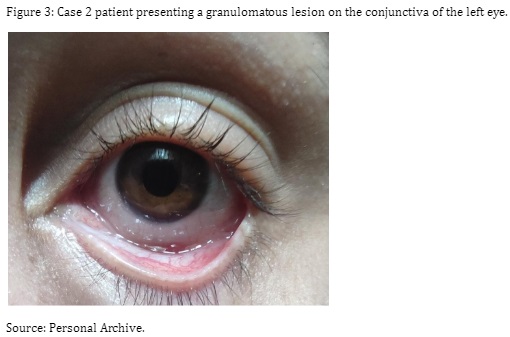Ocular sporotrichosis in veterinary medicine professionals: Case reports and a warning for zoonotic transmission.
DOI:
https://doi.org/10.21708/avb.2023.17.4.11975Resumo
Sporotrichosis is a dermal zoonosis caused by the fungus of the Sporothrix genus, naturally found in the soil. However, the most relevant transmission, currently, occurs through scratching, biting and contact with the lesions discharge of infected felines, therefore, veterinary doctors, nurses and veterinary medicine students are part of the most affected group by the disease. In humans, the most observed clinical form is the cutaneous lymphatic, yet, reports of other unusual presentations in patients without comorbidities, for example, mucosal and conjunctival involvement, were made. In the present study, two cases of extracutaneous ophthalmic sporotrichosis in humans with the development of sequels were described. This clinical presentation is usually related to the inhalation of spores, but it does not seem to have occurred in any of the cases. It is crucial to elucidate the accidents during the work of veterinarians and the importance of biosafety protocols for these professionals.
Downloads

Downloads
Publicado
Edição
Seção
Licença
Copyright (c) 2024 Acta Veterinaria Brasilica

Este trabalho está licenciado sob uma licença Creative Commons Attribution 4.0 International License.
Autores que publicam na Acta Veterinaria Brasilica concordam com os seguintes termos: a) Autores mantém os direitos autorais e concedem à revista o direito de primeira publicação, com o trabalho simultaneamente licenciado sob a Licença Creative Commons Attribution que permite o compartilhamento do trabalho com reconhecimento da autoria e publicação inicial nesta revista. b) Autores têm autorização para assumir contratos adicionais separadamente, para distribuição não-exclusiva da versão do trabalho publicada nesta revista (ex.: publicar em repositório institucional ou como capítulo de livro), com reconhecimento de autoria e publicação inicial nesta revista. c) Autores têm permissão e são estimulados a publicar e distribuir seu trabalho online (ex.: em repositórios institucionais ou na sua página pessoal) a qualquer ponto antes ou durante o processo editorial, já que isso pode gerar alterações produtivas, bem como aumentar o impacto e a citação do trabalho publicado (Veja O Efeito do Acesso Livre).


 Esta obra está licenciada com uma Licença
Esta obra está licenciada com uma Licença 